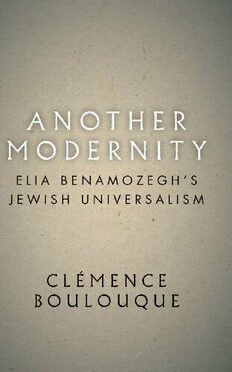
Another Modernity: Elia Benamozegh’s Jewish Universalism PDF
Preview Another Modernity: Elia Benamozegh’s Jewish Universalism
2 Another Modernity 3 Stanford Studies in Jewish History and Culture A N O T H ER M O D ER N I T Y o Elia Benamozegh’s Jewish Universalism CLÉMENCE BOULOUQUE Stanford University Press Stanford, California Stanford University Press Stanford, California © 2020 by the Board of Trustees of the Leland Stanford Junior University. All rights reserved. No part of this book may be reproduced or transmitted in any form or by any means, electronic or mechanical, including photocopying and recording, or in any information storage or retrieval system without the prior written permission of Stanford University Press. Printed in the United States of America on acid-free, archival-quality paper Library of Congress Cataloging-in-Publication Data available on request. LCCN 2020937846 | ISBN 9781503612006 (cloth) Cover design by Rob Ehle Typeset by Kevin Barrett Kane in 10.25/15 Adobe Caslon Pro To my parents This page intentionally left blank CONTENTS Acknowledgments ix Abbreviations xiii Introduction 1 Part I. Benamozegh’s Texts and Contexts: Morocco, the Risorgimento, and the Disputed Manuscript 15 1 The Moroccan World of a Livornese Jew 17 2 An Italian Jewish Patriot in the Risorgimento 27 3 The Banned Author and the Oriental Publisher 37 4 Expanding His Readership: Benamozegh’s Turn to French 46 5 The Afterlives of a Manuscript 53 Part II. Universalism as an Index of Jewish Modernity 63 6 Situating Benamozegh in the Debate on Jewish Universalism 65 7 Normativity and Inclusivity in Modernity: The Role and Limits of the Noahide Laws 83 8 Cosmopolitanism and Universalism: The Political Value of Judaism in an Age of Nations 93 vii viii CONTENTS 9 Universalism in Particularism: Benamozegh’s Legacies, between Levinas and Religious Zionism 102 Part III. Beyond Binaries: Kabbalah as a Tool for Modernity 107 10 Kabbalah: Reason and the Power of Myth 109 11 Beyond Dualism: Kabbalah and the Coincidence of Opposites 122 12 Kabbalah as Politics 133 Part IV. Past Enmity: Modes of Interreligious Engagement and Jewish Self-Affirmation 149 13 Religious Enmity and Tolerance Reconsidered 151 14 “The Iron Crucible” and Loci of Religious Contact 162 15 Self-Assertion and a Jewish Theology of Religions 173 16 Modes of Interreligious Engagement: From Theory to Social Practices 183 Epilogue 193 Notes 197 Bibliography 261 Index 295 ACKNOWLEDGMENTS It is a daunting task to turn my immense gratitude into an exercise in brevity. It all started when the Department of Hebrew and Judaic Studies at New York University gave a chance to an unorthodox applicant for their PhD program. My adviser in the Hebrew and Judaic Studies Department, Elliot Wolfson, gave me both guidance and space to grow. The sheer magnitude of his scholarship, his enduring presence, and his dedication have been an inspi- ration. I also thank Zvi Ben Dor Benite, David Engel, Stefanos Geroulanos, and Elli Stern on my committee, whose judicious observations helped me make sense of Benamozegh’s voices and to start thinking of the book that could emerge from the abundance of Benamozegh materials. I am grateful to Marion Kaplan and Dan Fleming who morphed from teachers into friends, as well as Larry Wolff, Michah Gottlieb, Hasia Diner, and Adam Becker. Joseph Weiler invited me to become a fellow at what was then the Tikvah Institute at NYU, an autonomous republic in Washington Square Park that he codirected with Moshe Halbertal and where all senior scholars found the time to nurture their junior fellows. Pierre Birnbaum, Jonathan Garb, Marc Hirshman, Lawrence Kaplan, James Kugel, Benjamin Sommer, and Yehoyada Amir among others have broadened my perspectives in so many ways, as has Suzanne Stone and the seminars on legal theory at the Center for Jewish Law and Contemporary Civilization. Allan Amanik, Ruth Kara-Ivanov, Yehuda and Michelle Sarna have been the best constellation of
